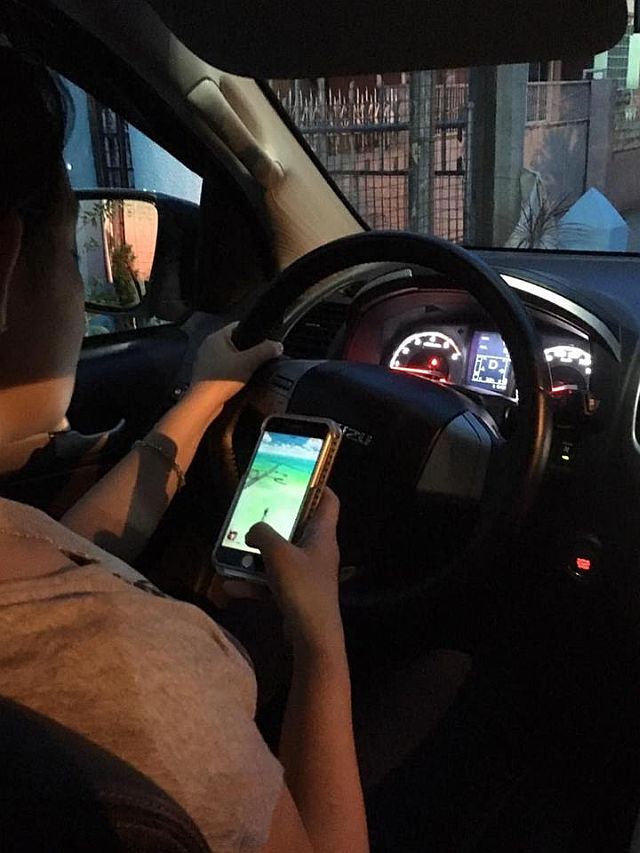
Pokemon Go is a fun game to play but not when driving because it contains the worst elements of driver distraction. (CONTRIBUTED PHOTO/JOJO JUDILLA)
How to avoid driving distractions like Pokemon Go
The release of the smartphone game Pokemon Go recently may just mark a new high (or low, depending on how you look at it) in incidents of distracted driving. Car crashes involving drivers distracted by the game have been reported in New York City, Melbourne, Washington and Baltimore.
The game potentially contains the worst elements of driver distraction: visual, manual and cognitive attention taken away from the task of driving.
Visual means that you are looking away from the road while driving.
Manual pertains to holding a cell phone or other device with one or both hands, thus not holding the steering wheel properly.
Cognitive distraction is less easily perceived but no less deadly: it means that your mind is not on the task of driving. You may be looking straight at the road ahead, and your hands are at the controls, but you are not fully aware of your surroundings. This delays your reactions and can cause a crash.
In recognition of the dangers of distracted driving, our esteemed lawmakers have passed the Anti-Distracted Driving Act. The bill defines distracted driving as “using a mobile communications device to write, send, or read a text-based communication or to make or receive calls,” as well as “using an electronic entertainment or computing device to play games, watch movies, surf the Internet, compose messages, read e-books, perform calculations and other similar acts.”
These activities will be banned while driving a vehicle in motion or stopped for a red light.
Stiff penalties include fines from P5,000 for the first offense, P10,000 for the second offense, to P15,000 and suspension of driver’s license for three months for the third offense.
Public utility vehicle drivers, including school service vehicles, can be subjected to a P30,000 fine if caught within 50 meters of a school.
It is a timely measure. Research into distracted driving in the USA concludes that it contributes to 16 percent of all fatal crashes and leads to around 5,000 deaths every year.
Drivers talking on cell phones are four times more likely to be involved in a crash.
The bill’s stiff penalties have certainly caught the attention of the motoring public, even if cynics point out that the high fines will make bribery a more likely outcome.
The upcoming law is certainly a good starting point. If followed, the regulation removes the visual and manual distraction of a mobile device.
But that’s not all. The bill says that it is not considered distracted driving if a device is “done using the aid of a hands-free function such as a speaker phone, earphones and microphones… which allow a person to make and receive calls without having to hold the… device: Provided, that the… device… does not interfere with the line of sight of the driver.”
This may lead to a flurry of sales of cell phone holders, headphones or headsets that allow hands-free operation. Carmakers will highlight their Bluetooth-enabled infotainment systems as safer (and certainly legal) alternatives.
But the most dangerous effect of mobile device use is the cognitive one. Studies have shown that even when using a hands-free device, the driver is still very much distracted.
Using various voice command systems has drivers logging moderate distraction to very high distraction. Even after stopping use of a device such as a phone or navigation system, there is a “latency effect” where drivers are still not fully attentive — this lasts a long 27 seconds. Hands-free doesn’t mean brain free, according to the data.
The American Automobile Association shares some tips to avoid distractions while driving:
Fully focus on driving. Don’t let anything divert your attention. Actively scan the road and watch out for pedestrians and cyclists.
Store loose gear and possessions so they don’t roll around.
Make adjustments: GPS, seats, mirrors, audio — before driving.
Finish dressing and grooming at home before you get on the road.
Avoid eating meals and snacks while driving.
Secure children and pets before driving off.
Put aside electronic distractions. Don’t use cell phones — handheld or hands-free — while driving.
Never text messages, read e-mails and play video games — even those built into the vehicle.
/motioncars.inquirer.net

